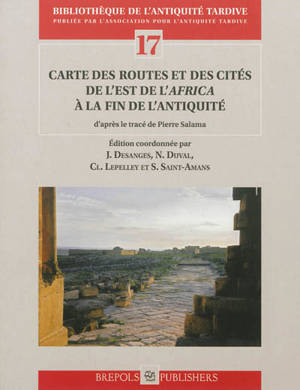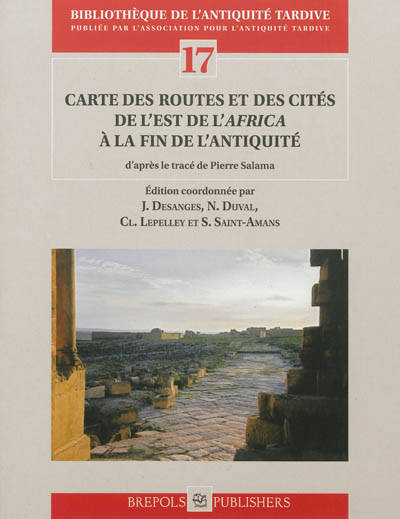
- Retrait gratuit dans votre magasin Club
- 7.000.000 titres dans notre catalogue
- Payer en toute sécurité
- Toujours un magasin près de chez vous
- Retrait gratuit dans votre magasin Club
- 7.000.0000 titres dans notre catalogue
- Payer en toute sécurité
- Toujours un magasin près de chez vous
Carte des routes et des cités de l'Est de l'Africa à la fin de l'antiquité d'après le tracé de Pierre Salama
Nouvelle édition des 'Voies romaines de l'Afrique du Nord' conçue en 1
Pierre Salama, J. DesangesDescription
Bibliothèque de l'antiquité tardive
Résumé
Pierre Salama avait publié à Alger, en 1951, un volume sur les Voies romaines de l'Afrique du Nord qui contenait une carte au 1/1 500 000e du réseau routier, imprimée dès 1949. Cinquante ans plus tard, un groupe d'africanistes s'est proposé de publier la nouvelle carte dont, depuis les années 1970, P. Salama préparait le tracé, sur des calques de la carte de l'Institut de Géographie National français au 1/500 000e, mais seulement pour la partie orientale du Maghreb. L'IGN s'est chargé d'imprimer ces tracés sur un fond de carte géographique en couleurs, indiquant le relief, atténué, et l'hydrographie.
Les auteurs ont aussi préparé une introduction apportant l'essentiel des précisions nécessaires au lecteur qui aborderait l'archéologie des routes sans études préalables.
Les sites localisés sur la carte font l'objet de notices plus ou moins détaillées, indiquant les différents noms antique et moderne qui justifient l'identification et la localisation, résumant les étapes essentielles de l'histoire administrative et décrivant les principaux vestiges archéologiques pour les différentes périodes de son occupation.
Cette « nouvelle carte Salama » n'a pu paraître avant le décès récent de notre ami et collègue, mais elle avait été examinée et approuvée par lui.
Summary
In 1951, Pierre Salama published a book in Algiers entitled Voies romaines de l'Afrique du Nord, which featured a map of the road network at the scale of 1:1 500 000, printed as soon as 1949. Fifty years later, a group ofAfricanists have decided to publish this new map using the layout that Pierre Salama had been working on since the 70's, based on overlays of the map of the French National Institute of Geography (IGN) at the scale of 1:500 000, but only for the western part of the Maghreb. The IGN printed this layout on a geographical mother map with colours, an indication of landforms and river system.
The authors have also written an introduction providing the necessary information to the reader approaching road archaeology without former training.
The sites identified on the map are dealt with in notes with varying degrees of detail. The notes give the Ancient and Modern names justifying the identification and location of each site. They also provide a summary of the main steps of their administrative history and describe the main archaeological remains for the different periods of occupation.
This « New Salama Map » could not be published before the recent death of our friend and colleague, but was submitted to his careful scrutiny and approval.
Spécifications
Parties prenantes
- Auteur(s) :
- Editeur:
Contenu
- Nombre de pages :
- 345
- Langue:
- Français
- Collection :
- Tome:
- n° 17
Caractéristiques
- EAN:
- 9782503513201
- Date de parution :
- 15-10-10
- Format:
- Livre broché
- Format numérique:
- Trade paperback (VS)
- Dimensions :
- 220 mm x 280 mm
- Poids :
- 1564 g

Les avis
Nous publions uniquement les avis qui respectent les conditions requises. Consultez nos conditions pour les avis.






